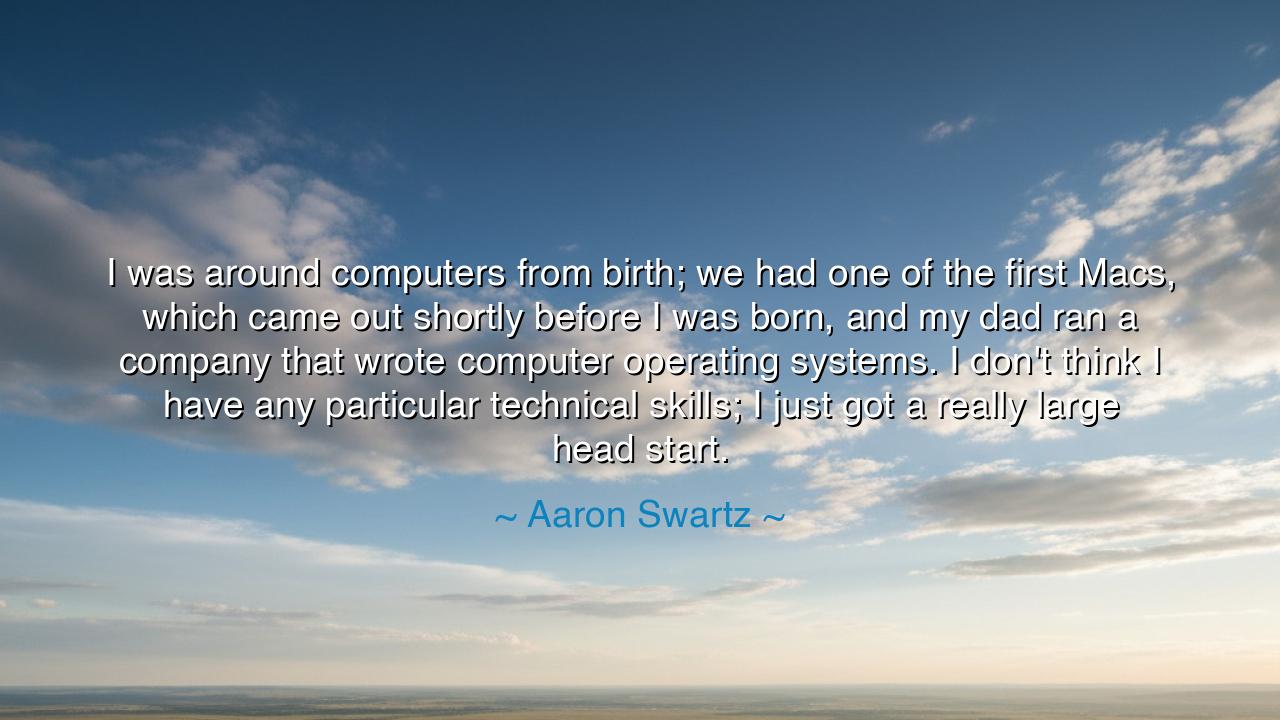
I was around computers from birth; we had one of the first Macs
I was around computers from birth; we had one of the first Macs, which came out shortly before I was born, and my dad ran a company that wrote computer operating systems. I don't think I have any particular technical skills; I just got a really large head start.






"I was around computers from birth; we had one of the first Macs, which came out shortly before I was born, and my dad ran a company that wrote computer operating systems. I don't think I have any particular technical skills; I just got a really large head start." These words, spoken by the visionary and restless mind Aaron Swartz, echo the essence of a truth that transcends time: that of opportunity and the gifts of the past that shape the paths of those who come after. What Swartz reveals here is not just about technology, but about the role of privilege, timing, and legacy in one’s ability to achieve greatness. This is a tale as old as time, one that speaks to the forces beyond the control of any single individual, forces that shape lives and destinies in ways both visible and hidden.
In ancient days, great empires rose and fell on the backs of those who were born in the right place at the right time. The philosophers of old, such as Socrates and Aristotle, spoke of fortune, of fate, and of how the seeds of wisdom were planted long before the harvest of understanding could be reaped. Swartz’s words, though rooted in a time far removed from those classical teachings, echo this same realization: that his mastery, his understanding, did not come purely from personal merit, but from being born into an environment where knowledge was both abundant and accessible. He had the head start of a child who was born with not just the ability to learn, but with the very tools of the future at his fingertips.
The Macintosh, that early marvel of computing, was not just a machine; it was a window into an entirely new world, a portal to endless possibilities. In the same way that ancient scribes had their scrolls and ink, Swartz’s generation had their computers—devices capable of altering the very fabric of human existence. Yet, he humbly acknowledges that his understanding of these devices was not born of personal genius, but rather from the privilege of having access to them at an early age. Like a mighty river that carves through the landscape, the flow of technology shaped the lives of those born into its current, and in this current, Swartz was carried.
It is not unlike the story of great kings and scholars of old, those born into families of wealth or knowledge who inherited the legacies of their forebears. Alexander the Great, for instance, was tutored by the great philosopher Aristotle, and his education, begun at an early age, shaped the mind of one of history’s most formidable conquerors. Similarly, Swartz’s understanding of computers was not merely through individual effort but through the deep influence of his father’s work—a foundation that allowed him to soar in the world of programming and digital innovation. He had a head start, a phrase that encapsulates the unearned advantages bestowed upon those who happen to be in the right place at the right time.
Yet, there lies a deeper lesson within Swartz’s reflection—a lesson that calls us to humility and self-awareness. Too often, in this age of rampant individualism, we are quick to claim all credit for our successes. But true wisdom, the kind passed down through generations, teaches us to acknowledge the confluence of circumstances that made our paths possible. Swartz’s admission is a reminder that no one achieves greatness alone. Opportunity, family, and timing are the unseen forces that help us ascend. Just as a mighty tree grows not only through its own strength but through the soil that nourishes it, so too do we rise on the backs of the conditions we are given.
The greatness of Swartz, then, lies not solely in his technical skills or his knowledge, but in his humility to recognize that what he accomplished was the result of an intricate dance between fate and opportunity. He encourages us to see the larger picture, to understand that we, too, are products of forces beyond our control, and that acknowledging our privileges—whether of birth, time, or opportunity—does not diminish our worth, but rather enriches our understanding of our place in the world. There is wisdom in seeing that the knowledge we hold is often shaped by the experiences of others.
Finally, the lesson to take from these words is not to discredit one’s own efforts or to dismiss the importance of individual striving, but to recognize that true wisdom is not only about what we know, but how we came to know it. Swartz’s reflection encourages us to see our gifts and talents as part of a broader web of connections, not as isolated achievements, and to carry that awareness with us as we move forward in life. To learn from those who came before, to appreciate the privileges we have, and to use them to enrich not just ourselves, but those around us—that is the ultimate goal.
As we chart our own course through this vast sea of possibility, let us remember that the head start of others has shaped the world in ways both subtle and profound. We, too, must offer others the same privilege of opportunity, so that they may rise and innovate, just as Swartz did, and leave their own mark on the world. Let us foster an environment of learning and sharing, where the knowledge of the past is not hidden or hoarded, but passed freely to the generations yet to come.






AAdministratorAdministrator
Welcome, honored guests. Please leave a comment, we will respond soon